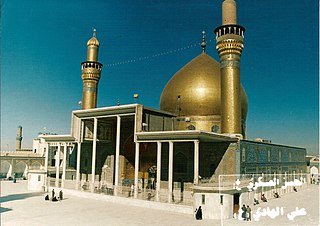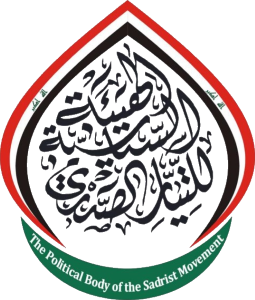
The Islamic Supreme Council of Iraq is a Shia Islamist Iraqi political party. It was established in Iran in 1982 by Mohammed Baqir al-Hakim and changed its name to the current Islamic Supreme Council of Iraq in 2007. Its political support comes from Iraq's Shia Muslim community.

The National Assembly is the unicameral legislature of Kuwait. The National Assembly meets in Kuwait City. Political parties are illegal in Kuwait, candidates run as independents. The National Assembly is made up of 50 elected members and 16 appointed government ministers.

The National Iraqi Alliance, also known as the Watani List, is an Iraqi electoral coalition that contested the 2010 Iraqi legislative election. The Alliance is mainly composed of Shi'a Islamist parties. The alliance was created by the Supreme Council for Islamic Revolution in Iraq to contest in the January 2005 and December 2005 under the name United Iraqi Alliance, when it included all Iraq's major Shi'a parties. The United Iraqi Alliance won both those of elections however later fell apart after several major parties left the alliance due to disputes with Prime Minister Nouri al-Maliki and the Supreme Council.
Sheikh Adel Al Mouwda was the second deputy chairman of Bahrain's parliament of 2002, the Chamber of Deputies, and the former leader of salafist party, Asalah. Sheikh Al Mouwda is considered the leading spokesman for political Islam in Bahrain and is known for his forthright views, which has seen him often quoted in the international press.

The 2006 al-Askari Shrine bombing occurred on 22 February 2006 at approximately 6:44 a.m. local Iraqi time, and targeted the al-Askari Shrine in the city of Samarra, Iraq. The attack on the mosque, one of the holiest sites in Shia Islam, has not been claimed by any group; the then President of the United States, George W. Bush, suggested from "evidence" that the bombing was an al-Qaeda plot. Although the mosque was severely damaged from the blast, there were no casualties.

The Sadrist Movement is an Iraqi Islamic national movement led by Muqtada al-Sadr. The movement draws wide support from across Iraqi society and especially from the Shi'a poor in the country. The most important person in setting the goals and the philosophy of the movement was Grand Ayatollah Mohammad Mohammad Sadeq al-Sadr. A prominent preceding influence had also been Muhammad Baqir al-Sadr. The movement is religious and populist. Its goal is a society ordered by a combination of religious laws and tribal customs.
The term militia in contemporary Iraq refers to armed groups that fight on behalf of or as part of the Iraqi government, the Mahdi Army and Badr Organization being two of the biggest. Many predate the overthrow of Saddam Hussein, but some have emerged since, such as the Facilities Protection Service.

General elections were held in Bahrain in November and December 2006 to elect the forty members of the Council of Representatives. The first round of voting was held on 25 November, with a second round on 2 December 2006.
The Soldiers of Heaven or Jund As-Samāʾ, were an armed Iraqi Shi'a messianic sect who suffered major losses, and their leader Dia Abdul Zahra Kadim killed, in the late January 2007 Battle of Najaf, as they allegedly attempted to start a "messianic insurrection" against the holy city of Najaf and the grand ayatollahs living there during the holy day of Ashura.

The origin of Shia–Sunni relations can be traced back to a dispute over the succession to the Islamic prophet Muhammad as a caliph of the Islamic community. After the death of Muhammad in 632, a group of Muslims, who would come to be known as the Sunnis, believed that Muhammad's successor should be Abu Bakr, whereas a second group of Muslims, who would come to be known as the Shias, believed that his successor should have been Ali. This dispute spread across various parts of the Muslim world, which eventually led to the Battle of Jamal and Battle of Siffin. Sectarianism based on this historic dispute intensified greatly after the Battle of Karbala, in which Husayn ibn Ali and some of his close partisans, including members of his household, were killed by the ruling Umayyad Caliph Yazid I, and the outcry for revenge divided the early Islamic community, albeit disproportionately, into two groups, the Sunni and the Shia. This is known today as the Islamic schism.
Ahmed Lari is a member of the Kuwaiti National Assembly, representing the first district. Born in 1955, Lari studied Statistics and worked in the Municipal Council before being elected to the National Assembly in 2006. While political parties are technically illegal in Kuwait, Lari is a member of the National Islamic Alliance, a Shia party.

The Popular Action Bloc is a political bloc in Kuwait headed by veteran former Speaker Ahmed Al-Sadoun. The group focuses on populist issues like housing, salary raises, and reform.

Saleh Ashour is a member of the Kuwaiti National Assembly, representing the first district.
Waleed Al-Tabatabaie was a member of the Kuwaiti National Assembly, who represented the third district. Born on 4 April 1964, Al-Tabtabaie obtained a PhD in Islamic studies from Al-Azhar and was an assistant professor at Kuwait University before being elected to the National Assembly in 1996. Al-Tabtabaie affiliated with the Islamist deputies.
The Saudi government does not conduct a census on religion or ethnicity, but some sources estimate the Shiite population in Saudi Arabia to make up around 10-15% of the approximately 23 million natives of Saudi Arabia. The modern Kingdom of Saudi Arabia was formed in 1932 by the House of Saud, who are followers of a movement within Sunni Islam known as Wahhabism. Followers of the Wahhabite mission—who dominate religious institutions, courts and education of the kingdom—believe that "Muslims should return to the interpretation of Islam found in the classical texts, the Quran and the Sunnah." They also believe that "Muslims who seek intercession from holy men, such as the imams revered by Shiites, are not 'true' Muslims."

General elections were held in Bahrain in October 2010 to elect the forty members of the Council of Representatives. The first round of voting was held on 23 October, with a second round on 30 October. Amidst boycotts and arrests, Al Wefaq won 18 of the 40 seats. Four women were elected.
Shia Islam constitutes a significant minority in Kuwait. In 2001, the US Department of State reported that there were 300,000 Shia Kuwaiti citizens and 820,000 Kuwaiti citizens in total thus Shias formed 36.5% of the Kuwaiti citizen population. In 2002, the US Department of State reported that Shia Kuwaitis formed 30-40% of Kuwait's citizen population, noting there were 525,000 Sunni citizens and 855,000 Kuwaiti citizens in total. In 2004, there were 300,000-350,000 Shia Kuwaiti citizens and 913,000 Kuwaiti citizens in total. The Strategic Studies Institute reported that they constitute 40% of the population in 2008.
This article concerns the formation process of the Al Maliki I Government of Iraq in the aftermath of the Iraq National Assembly being elected on December 15, 2005. Due to disputes over alleged vote-rigging the results of the election were only certified by the Independent Electoral Commission of Iraq on February 10, 2006.

Anti-Shi'ism is hatred of, prejudice against, discrimination against, persecution of, and violence against Shia Muslims because of their religious beliefs, traditions, and cultural heritage. The term was first used by Shia Rights Watch in 2011, but it has been used in informal research and written in scholarly articles for decades.

The Alliance Towards Reforms or Marching Towards Reform, also known by its Arabic short form Saairun, is an Iraqi electoral coalition formed to gain political control in the 2018 general election. The main components are the Shi’a Islamist Sadrist Integrity Party, the leftist Iraqi Communist Party, the Youth Movement for Change Party, the Party of Progress and Reform and the Iraqi Republican Group and the State of Justice Party. The alliance won 54 seats, more than any other coalition in the election.










